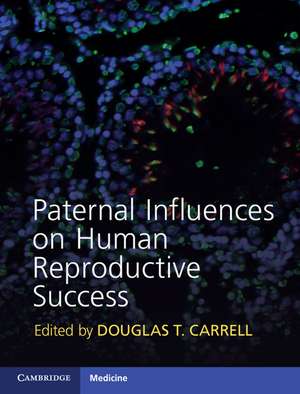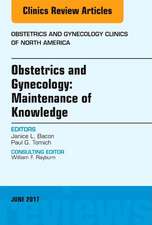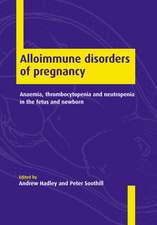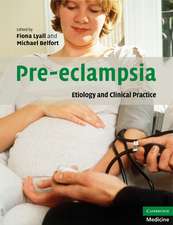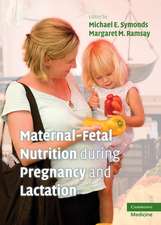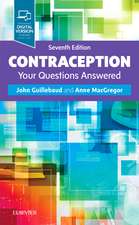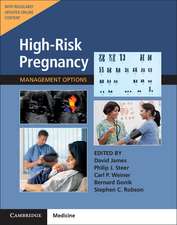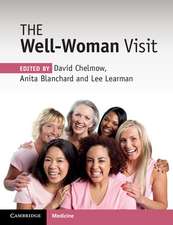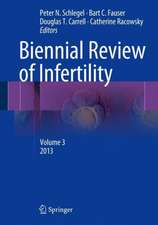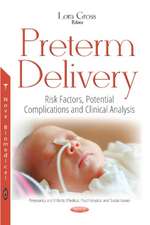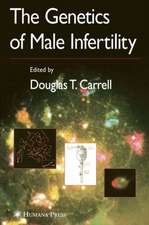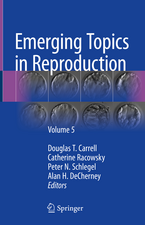Paternal Influences on Human Reproductive Success
Editat de Douglas T. Carrellen Limba Engleză Hardback – 10 apr 2013
Preț: 596.20 lei
Preț vechi: 627.57 lei
-5% Nou
Puncte Express: 894
Preț estimativ în valută:
114.12€ • 119.66$ • 94.29£
114.12€ • 119.66$ • 94.29£
Carte tipărită la comandă
Livrare economică 29 ianuarie-12 februarie 25
Preluare comenzi: 021 569.72.76
Specificații
ISBN-13: 9781107024489
ISBN-10: 110702448X
Pagini: 204
Ilustrații: 30 b/w illus. 19 colour illus.
Dimensiuni: 192 x 253 x 15 mm
Greutate: 0.64 kg
Ediția:New.
Editura: Cambridge University Press
Colecția Cambridge University Press
Locul publicării:New York, United States
ISBN-10: 110702448X
Pagini: 204
Ilustrații: 30 b/w illus. 19 colour illus.
Dimensiuni: 192 x 253 x 15 mm
Greutate: 0.64 kg
Ediția:New.
Editura: Cambridge University Press
Colecția Cambridge University Press
Locul publicării:New York, United States
Cuprins
Preface; Part I. Advances in Understanding the Male Gamete: 1. The reproductive fitness of the human male gamete Douglas T. Carrell; 2. The sperm genome: effect of aneuploidies, structural variations, single nucleotide changes and DNA damage on embryogenesis and development Kenneth I. Aston and Donald F. Conrad; 3. The sperm epigenome: a role in embryogenesis and fetal health? Douglas T. Carrell and Jessie Dorais; 4. Imprinted gene anomalies in sperm C. Joana Marques and Mário Sousa; 5. Has the renewed interest in sperm RNA led to fresh insights? A critical review and hypothesis David Miller and David Iles; 6. The role of the sperm centrosome in reproductive fitness Heide Schatten and Qing-Yuan Sun; Part II. The Influence of Aging and Environmental Factors on Male Reproductive Fitness: 7. The male biological clock Harry Fisch; 8. The role of aging on fecundity in the male Csilla Krausz and Chiara Chianese; 9. Aging, DNA damage, and reproductive outcome Aleksander Giwercman and Jens Peter Bonde; 10. Paternal aging and increased risk of congenital disease, psychiatric disorders, and cancer Simon L. Conti and Michael L. Eisenberg; 11. Sexual function in the aging male John R. Gannon, Jeremy B. Myers and William O. Brant; 12. Supplements and replacement therapies for the aging male and their effects on reproductive fitness Armand Zini and Naif Al-hathal; 13. Environment and lifestyle effects on fertility Marc A. Beal and Christopher M. Somers; 14. Obesity and male infertility: is there an effect on embryogenesis? Oumar Kuzbari and Ahmad O. Hammoud; Part III. Clinical Laboratory Concepts and Considerations: 15. ICSI: does the sperm matter? Gianpiero D. Palermo, Queenie V. Neri and Zev Rosenwaks; 16. Sperm selection and ART outcome: a means to overcome the effects of aging and abnormal spermatogenesis? Denny Sakkas; 17. Variability of human semen quality: caution in interpreting semen analysis data Kenneth I. Aston; 18. Semen characteristics and aging: technical considerations regarding variability Lars Björndahl; Index.
Descriere
The only book focussing on the growing understanding of paternal contributions to the embryo and its health.
